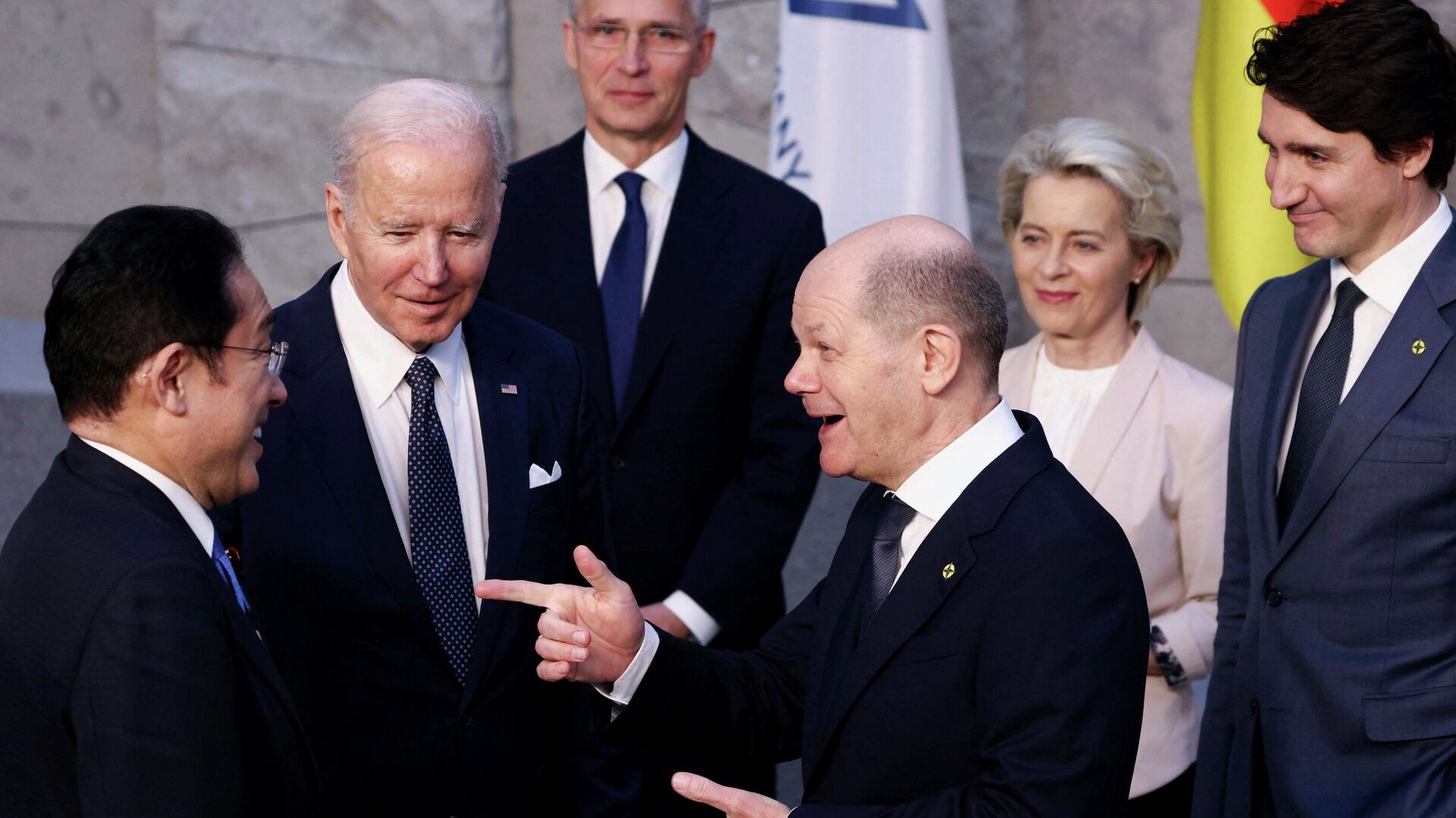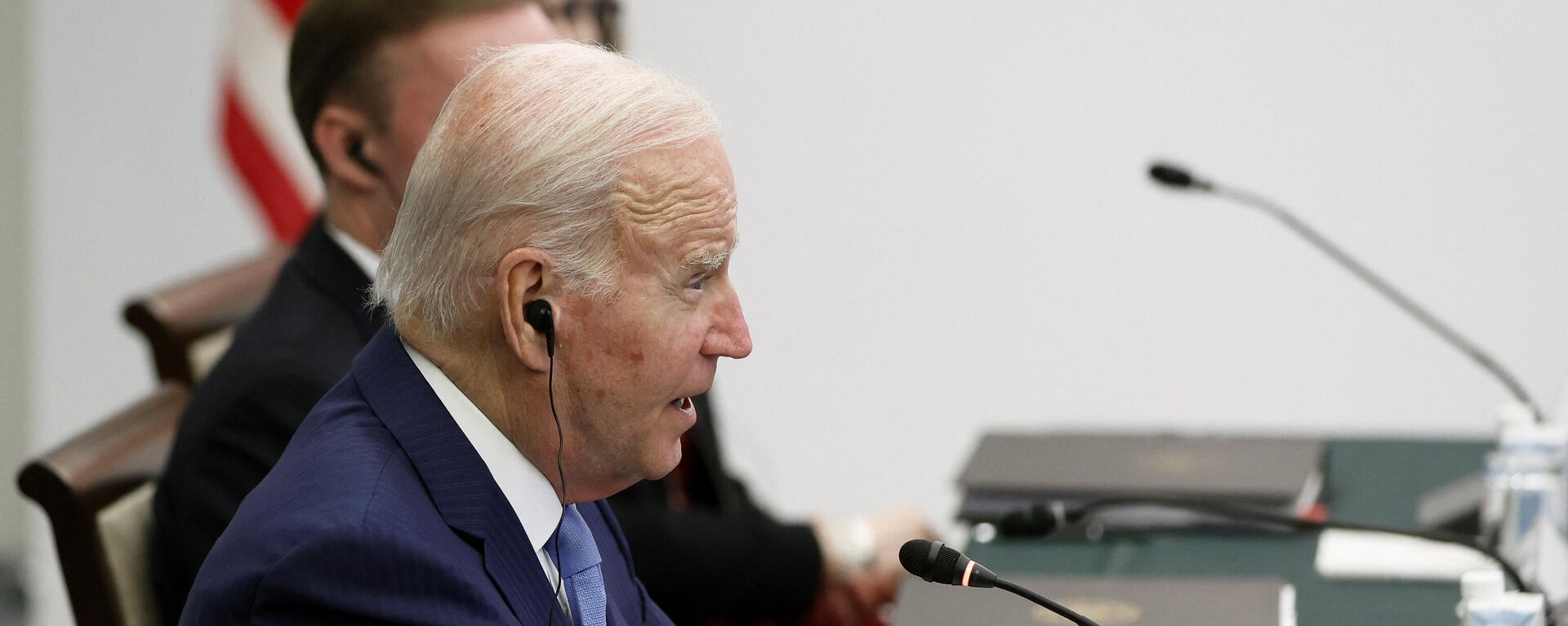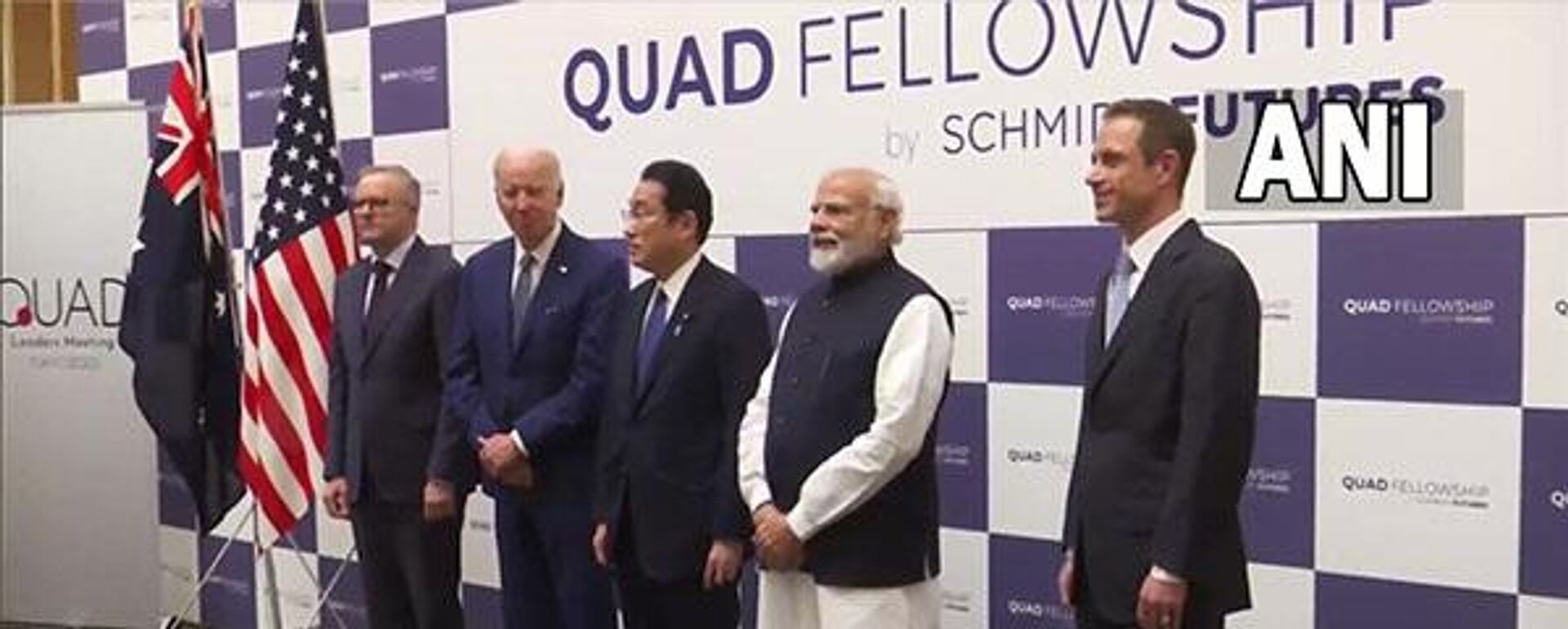https://sputnikglobe.com/20230518/g7-hiroshima-summit-fading-bloc-sticking-to-its-guns-to-contain-china-russia-1110444787.html
G7 Hiroshima Summit: Fading Bloc Sticking to Its Guns to Contain China, Russia
G7 Hiroshima Summit: Fading Bloc Sticking to Its Guns to Contain China, Russia
Sputnik International
Leaders of the Group of Seven will gather this weekend for the summit in Hiroshima, Japan, to discuss a vast variety of topics, with focus on Russia and China, as Western sanctions and the proxy war in Ukraine bear little, if any, fruit. What's the G7 and does the format correspond to the ongoing geopolitical changes?
2023-05-18T18:19+0000
2023-05-18T18:19+0000
2023-05-18T18:19+0000
analysis
us
europe
european union (eu)
g7
hiroshima
russia
china
ukraine
nato
https://cdn1.img.sputnikglobe.com/img/07e6/04/13/1094877920_0:165:3055:1883_1920x0_80_0_0_a5f1fb8966d9ffc209aab92952035898.jpg
"The G7 is nowadays not really anything more than or different from the key members of NATO and its most submissive client states, merely wearing their economic top hats rather than their military berets," Nick Griffin, British political analyst and former MEP, told Sputnik. "It's just another institution at whose meetings the Western political elite get the chance to look important while they take their orders from senile Uncle Sam. It's an echo chamber in which they slap each other's backs and confirm their pre-existing prejudices."What's G7?The G7 format originates in the 1970s, while the world suffered from its first oil shock, subsequent financial crisis, and recession. The first meeting of the format was initiated by French President Valery Giscard d’Estaing and West German Chancellor Helmut Schmidt. It took place in 1975 at the Chateau de Rambouillet, 50 kilometers southwest of Paris.In the 1980s, the group extended its scope by embracing foreign and security policy issues. It brought together major industrialized nations, namely, Canada, France, Germany, Italy, Japan, the United Kingdom, and the United States. In 1998, Russia joined the organization. However, after Crimea reunited with the Russian Federation in the wake of the Western-backed February 2014 coup d'etat in Ukraine, the G7 suspended Moscow's membership.At the same time, the Global South has signaled that the industrialized nations overlook pressing issues and challenges haunting developing nations, while pushing ahead with its agenda. In particular, African billionaires and activists have condemned the "Global North's" de-carbonization and green agenda as a stumbling block to the energy development of the continent, which is rich with oil and gas. Likewise, the G7's anti-Russia sanctions have contributed to the ongoing food crisis, hindering Moscow's ability to deliver its food and fertilizers to the global market.G7 is Still Relevant, But Its Dominance is OverAs per the British politician, "the shift now very clearly has a momentum all of its own," as the dollar hegemony is fading and the influence of the G7 will wane in tandem with that. There are other factors contributing to this irreversible trend, including the US' erroneous spats with China and India, the West's suicidal energy sanctions against Russia, the subsequent de-industrialization of Germany, and the EU and "the WEF's de-carbonization mania being particularly noteworthy," according to Griffin. "In very simple terms, two centuries of Western financial and industrial domination of the world is coming to a grinding halt," he remarked.G7 Doesn't Want to Share Power With AnyoneDespite its influence on global politics shrinking, the G7 is not seeking to increase cooperation with other emerging blocs and formats, such as BRICS or the SCO."Perhaps, that is the main takeaway here - earlier attempts to expand membership were predicated on the idea that other nations would share the goals of this Western bloc pretty much completely. That assumption proved to be mistaken. Western leaders appear to have finally received this message (if belatedly) and that's why it makes sense for them to pull back and focus on the core group of allies. Meetings can always be held at a later point with other groups of countries to push the agenda points that have been agreed by that core group," she continued.At the same time, the G7 still controls an incredible level of economic and military power, Fuller pointed out. Thus, instead of stretching its hand out to other nations, the G7 is sticking together in order to cooperate against other powers – most notably Russia and China – "and using their combined might to contain them," according to her.From Global Policy-Makers to Regional FormatWhat's next for the G7? According to Sputnik's interlocutors, the G7 is unlikely to collapse completely. Instead, its influence and prestige is likely to shrink until it becomes a regionally important player, "one of the several poles of the multipolar world that is now emerging before our fascinated eyes," according to the British politician.
https://sputnikglobe.com/20230518/whats-your-view-of-g7s-relevance-in-todays-changing-world-1110441071.html
https://sputnikglobe.com/20230517/quad-leaders-to-meet-at-g7-after-biden-nixes-summit-to-handle-debt-ceiling-talks-1110426242.html
https://sputnikglobe.com/20230517/g7-summit-kicks-off-in-hiroshima-japan-1110421292.html
hiroshima
russia
china
ukraine
Sputnik International
feedback@sputniknews.com
+74956456601
MIA „Rossiya Segodnya“
2023
News
en_EN
Sputnik International
feedback@sputniknews.com
+74956456601
MIA „Rossiya Segodnya“
Sputnik International
feedback@sputniknews.com
+74956456601
MIA „Rossiya Segodnya“
g7 hiroshima summit, japan, russia, china, russian special operation in ukraine, taiwan island, nato, global south, brics, shanghai cooperation organization, asia pacific region, de-dollarization, g20
g7 hiroshima summit, japan, russia, china, russian special operation in ukraine, taiwan island, nato, global south, brics, shanghai cooperation organization, asia pacific region, de-dollarization, g20
G7 Hiroshima Summit: Fading Bloc Sticking to Its Guns to Contain China, Russia
Leaders of the Group of Seven will gather this weekend for the summit in Hiroshima, Japan, to discuss a vast variety of topics, with focus on Russia and China, as Western sanctions and the proxy war in Ukraine bear little, if any, fruit. What's the G7 and does the format correspond to the ongoing geopolitical changes?
"The G7 is nowadays not really anything more than or different from the key members of NATO and its most submissive client states, merely wearing their economic top hats rather than their military berets," Nick Griffin, British political analyst and former MEP, told Sputnik. "It's just another institution at whose meetings the Western political elite get the chance to look important while they take their orders from senile Uncle Sam. It's an echo chamber in which they slap each other's backs and confirm their pre-existing prejudices."
The G7 format originates in the 1970s, while the world suffered from its first oil shock, subsequent financial crisis, and recession. The first meeting of the format was initiated by French President Valery Giscard d’Estaing and West German Chancellor Helmut Schmidt. It took place in 1975 at the Chateau de Rambouillet, 50 kilometers southwest of Paris.
In the 1980s, the group extended its scope by embracing foreign and security policy issues. It brought together major industrialized nations, namely, Canada, France, Germany, Italy, Japan, the United Kingdom, and the United States. In 1998, Russia joined the organization. However, after Crimea reunited with the Russian Federation in the wake of the Western-backed February 2014 coup d'etat in Ukraine, the G7 suspended Moscow's membership.
For its part, Russia made it clear that it is not striving to return to the Western-centered format. Over the past two decades Russia has been participating in several other international formats, including BRICS – an acronym for Brazil, Russia, India, China and South Africa – and the Shanghai Cooperation Organization (SCO). Notably, in a sign of a changing world, BRICS countries now contribute 31.5% of global GDP based on purchasing power parity. For comparison's sake, the Group of Seven has fallen to 30.7%, according to some estimates.
At the same time, the Global South has signaled that the industrialized nations overlook
pressing issues and challenges haunting developing nations, while pushing ahead with its agenda. In particular, African billionaires and activists have condemned the "Global North's" de-carbonization and green agenda as
a stumbling block to the energy development of the continent, which is rich with oil and gas. Likewise, the G7's anti-Russia sanctions have contributed to the ongoing food crisis, hindering Moscow's ability to deliver its food and fertilizers to the global market.
G7 is Still Relevant, But Its Dominance is Over
"Of course the G7 is still relevant, but it is becoming less so at a rate which would have been unthinkable even just a few years ago," said Griffin. "In the end, the whole edifice of US unipolar power is built on the foundation of the status of the fiat currency US dollar as the global reserve currency with a virtual monopoly in terms of international trade. Washington's repeated strategic mistakes, particularly its doomed intervention in the Ukraine, piratical sanctions and ongoing alienation of key allies such as Saudi Arabia and Turkiye, have drastically accelerated the disintegration of this Dollar Imperium."
As per the British politician, "the shift now very clearly has a momentum all of its own," as the dollar hegemony is fading and the influence of the G7 will wane in tandem with that. There are other factors contributing to this irreversible trend, including the US' erroneous spats with China and India, the West's suicidal energy sanctions against Russia, the subsequent de-industrialization of Germany, and the EU and "the WEF's de-carbonization mania being particularly noteworthy," according to Griffin. "In very simple terms, two centuries of Western financial and industrial domination of the world is coming to a grinding halt," he remarked.
G7 Doesn't Want to Share Power With Anyone
Despite its influence on global politics shrinking, the G7 is not seeking to increase cooperation with other emerging blocs and formats,
such as BRICS or the SCO.
"I believe the reason they have maintained the G7 format, as opposed to simply abandoning this smaller group and meeting and acting as the G20 or some other more inclusive method, is twofold," Dr. Roslyn Fuller, director of the non-profit think tank Solonian Democracy Institute, told Sputnik. "Firstly, there are simply different interests opening up between some members of the G20 (e.g. China) and the members of the G7. The dispute over Taiwan features heavily in the communications about this G7 meeting, for example. Secondly, just coordinating and driving the policy of seven members, plus the EU, is already challenging. A larger number of members isn't always beneficial when one is trying to drive a clearly delineated agenda that one does not necessarily expect other countries to share."
"Perhaps, that is the main takeaway here - earlier attempts to expand membership were predicated on the idea that other nations would share the goals of this Western bloc pretty much completely. That assumption proved to be mistaken. Western leaders appear to have finally received this message (if belatedly) and that's why it makes sense for them to pull back and focus on the core group of allies. Meetings can always be held at a later point with other groups of countries to push the agenda points that have been agreed by that core group," she continued.
At the same time, the G7 still controls an incredible level of economic and military power, Fuller pointed out. Thus, instead of stretching its hand out to other nations, the G7 is sticking together in order to cooperate against other powers – most notably Russia and China – "and using their combined might to contain them," according to her.
"To expand the G7 format would mean sharing power and influence," echoed Griffin. "Of course, there are a myriad of logical reasons why cooperation with other major players makes sense in the real world. But real world considerations are not getting a look in; the clique running the USA and its client states are second and third-rate players who went into politics out of pure self-interest and because they lacked the talent to get to the top in more productive fields of endeavor. Once in that clique, they fall victim to the perils of 'group think.'"
From Global Policy-Makers to Regional Format
What's next for the G7? According to Sputnik's interlocutors, the G7 is unlikely to collapse completely. Instead, its influence and prestige is likely to shrink until it becomes a regionally important player, "one of the several poles of the multipolar world that is now emerging before our fascinated eyes," according to the British politician.
"What unites these countries today? They are all very developed countries with aging populations that risk economic stagnation. Some of them have become dependent on immigration to forestall this issue coming to a head. Some have partly de-industrialized. Thus, they still face many common economic challenges today," Fuller concluded.





